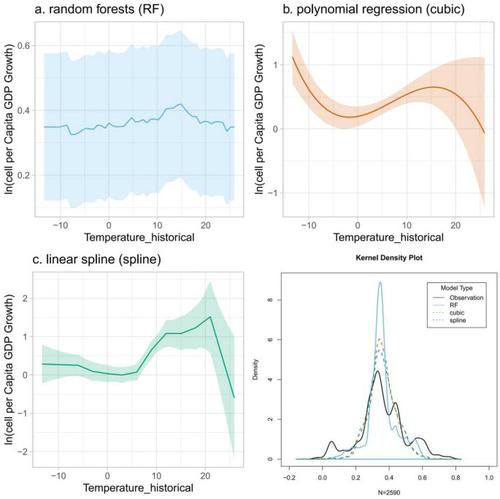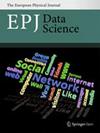温度对经济增长效应的影响:基于中国次国家级数据的方法开发与模型绩效评价
IF 2.5
2区 计算机科学
Q1 MATHEMATICS, INTERDISCIPLINARY APPLICATIONS
引用次数: 0
摘要
计算温度-经济增长关系是为了量化气候变化对经济的影响。然而,模型性能和研究之间预测的差异使气候计量估计的使用复杂化。机器学习方法提供了一种可能改善预测效果的替代方法。然而,时间序列和外推问题限制了随机森林等方法。我们通过汇总地方气候影响,对国家边际GDP增长进行了一个简单的思想实验,以缓解随机森林的缺陷。本文采用随机森林、多元三次回归和线性样条回归等方法考察了温度对经济发展的直接影响,并对这些方法进行了性能比较。模型结果表明,每种模型的最佳温度为15°C、15°C或21°C。此外,一项思想实验表明,对于升温1°C的模式,国家GDP的边际预测变化约为1%、- 3%或- 6%。性能比较表明,随机森林在自举中具有稳定的模型性能和较好的预测性能。然而,随机森林的外推问题导致5%的细胞在升温6°C时低估了气候影响。总的来说,我们的研究结果表明,在气候变化情景下的经济预测中应该考虑温度。我们还建议在气候影响评估中使用更多的机器学习方法。本文章由计算机程序翻译,如有差异,请以英文原文为准。

Temperature impact on the economic growth effect: method development and model performance evaluation with subnational data in China
Abstract Temperature-economic growth relationships are computed to quantify the impact of climate change on the economy. However, model performance and differences of predictions among research complicate the use of climate econometric estimation. Machine learning methods provide an alternative that might improve the predictive effects. However, time series and extrapolation issues constrain methods such as random forests. We apply a simple thought experiment with national marginal GDP growth by aggregating subnational climate impact to alleviate the shortcomings in random forests. This paper uses random forests, multivariate cubic regression, and linear spline regression to examine the direct impacts of temperature on economic development and conducts a performance comparison of the methods. The model results indicate an optimal temperature of 15°C, 15°C or 21°C for each model. Furthermore, a thought experiment indicates that the marginal predictions of national GDP changes by approximately 1%, −3%, or −6% for models with 1°C warming. The performance comparison suggests that random forests have stable model performance and better prediction performance in bootstrapping. However, the extrapolation problem in random forests causes underestimation of climate impact in 5% of cells under 6°C warming. Overall, our results suggest that temperature should be considered in economic projections under climate change scenarios. We also suggest the use of more machine learning methods in climate impact assessment.
求助全文
通过发布文献求助,成功后即可免费获取论文全文。
去求助
来源期刊

EPJ Data Science
MATHEMATICS, INTERDISCIPLINARY APPLICATIONS -
CiteScore
6.10
自引率
5.60%
发文量
53
审稿时长
13 weeks
期刊介绍:
EPJ Data Science covers a broad range of research areas and applications and particularly encourages contributions from techno-socio-economic systems, where it comprises those research lines that now regard the digital “tracks” of human beings as first-order objects for scientific investigation. Topics include, but are not limited to, human behavior, social interaction (including animal societies), economic and financial systems, management and business networks, socio-technical infrastructure, health and environmental systems, the science of science, as well as general risk and crisis scenario forecasting up to and including policy advice.
 求助内容:
求助内容: 应助结果提醒方式:
应助结果提醒方式:


